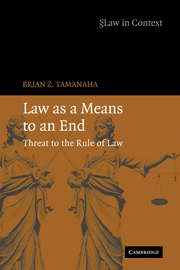13 - The threat to legality
Published online by Cambridge University Press: 25 July 2009
Summary
The U.S. legal system, to put it dramatically, is in danger of becoming less of a system of law. Concentrating on judging, this assertion will be demonstrated through two themes that have shown up at various points throughout this book. The first theme is that the rule-bound character of the legal system is reduced when achieving purposes or focusing on ends becomes the paramount goal of judges in their decisions. The second theme is that a legal system requires that judges render decisions according to the applicable rules, not according to their own political views or preferences. It is antithetical to the very notion of “the rule of law” for legal decisions to be determined by the personal views of the individual judge. Both of these themes raise vexing issues about the separation of law and politics in the decision-making of judges. The legal quality of the system – the reality of the rule of law – hinges upon how these issues are dealt with in contemporary law.
Antithesis between rule-bound and purpose orientation
Friedrich Hayek offered a highly influential definition of the rule of law: “Stripped of all technicalities, this means that government in all its actions is bound by rules fixed and announced before-hand – rules which make it possible to foresee with fair certainty how the authority will use its coercive powers in given circumstances and to plan one's individual affairs on the basis of this knowledge.”
- Type
- Chapter
- Information
- Law as a Means to an EndThreat to the Rule of Law, pp. 227 - 245Publisher: Cambridge University PressPrint publication year: 2006

